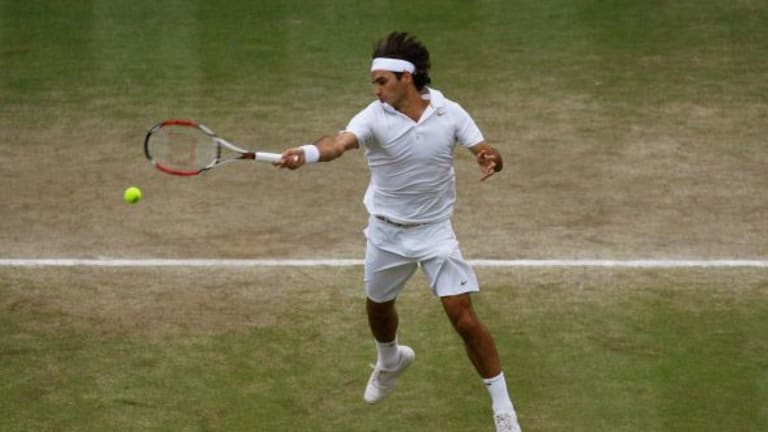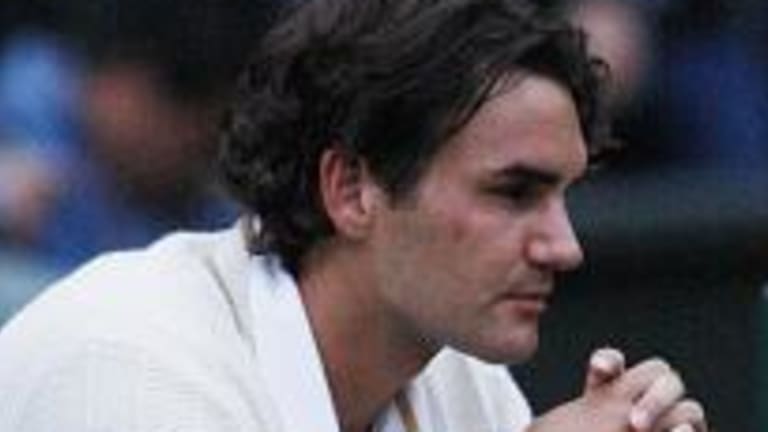Well, friends, I suppose it's time to focus on Roger Federer - something I chose not to do in passing, while trying to chronicle Rafael Nadal's epic triumph and Warrior Moment at Wimbledon on Sunday. Long time readers of this blog will know what I mean by the phrase, "Warrior Moment." We use it here to describe the kind of fightback (that's the word our British friends prefer to "comeback", and I think theirs is a better choice) Nadal mounted to win the match against perhaps the most formidable player ever to swing a racket at Wimbledon.
If you're relatively new here, a Warrior Moment is a career-defining (career to date, of course) moment in which a player presents his credentials as not just a great talent but a great champion on a suitably large stage against an appropriate opponent. Think Pete Sampras vs. Alex Corretja, in the U.S. Open of 1996. The tricky thing about a Warrior Moment is that realizing one is a matter of serendipity - being in the right place at the right time with the right opponent.
I've taken this Warrior Moment tack for a specific reason, because one of the outstanding features of the Wimbledon final is that it was, in all fairness, a Warrior Moment for both players. For this match was no mere case of a wonderful player digging himself out of a big hole to beat a fine opponent, but of two nonpareil combatants playing so well, with so little to choose between them, that the only reason Nadal won was because. . . someone must. Perhaps for that reason, I understand that a shot from the match will be the cover of the next issue of Sports Illustrated, and yes, I know how bitterly ironic that will seem to so many of you.
I wouldn't call it a coin flip, not by any stretch. There is, after all, a reason that people keep score in tennis, as unfair as that may seem to those fans who are less interested in outcomes than the performance itself. But in a better world than ours both players would be equally honored and receive equal measures of respect, not from some misguided "everyone gets a trophy" instinct, but because of how well they played, how close the match was, and the way each of them surmounted obstacles that appeared insurmountable to wend their way, like some bizzare heaven-made doubles team, to that unforgettable 9-7 in the fifth result.
So, whither Federer? A few random observations about the match before we go there:
One of the keys to the match, I felt, was Nadal's ability to get to Federer's backhand. This may seem like a duh! observation, but I was struck by the extent to which Federer, yielding psychological ground in a way that he is usually loath to do, tried to swing the flow of play to his forehand. This is a proud champion who has always played as if he doesn't need to protect a weakness, because in the big picture he has nothing that would pass muster as a weakness. Not against anyone but Nadal.
But in the last three sets, Federer worked hard to keep the ball on his forehand side, and his ability to do so paid rich dividends. It was his payoff for showing the kind of humility it takes to acknowledge a chink in his armor. He hit a pile of forehand winners that looked all the more remarkable because he was playing right into the lefty Nadal's most dangerous weapon, the forehand. The only glitch was that he wasn't able to protect the backhand to quite the degree he wanted, and in that regard, one point in particular stood out.
In the critical fourth-set tiebreaker, with Federer trailing 2 points to 4, but with serve, he engaged Nadal in a crisp rally, giving his opponent very little green space on the backhand side. Federer hit a good crosscourt backhand deep to Nadal's backhand - a shot deep enough, and with enough pace, for Federer to anticipate a safe, cross-court backhand return, right to his forehand. But Nadal played an offensive shot instead, firing a backhand down the line.
Now my notes aren't clear on whether it was that next backhand or a later one that forced Federer to make a down-the-line error, but that's immaterial. The point is that Nadal was quick enough to make a forcing, offensive shot that turned the tables on what looked like an extremely well-played set up by The Mighty Fed. It threw him off balance and the result was that Nadal found himself up 5-2, instead of 4-3.
Granted, it all went bad for Nadal in the tiebreaker shortly thereafter, but in the bigger picture the point was telling. No other player, including Novak Djokovic, has the resourcefulness and skill that Nadal showed in that exchange. Federer reaped great rewards from overplaying to the backhand side, but he paid a price, too. And in a match of this caliber, that can't be discounted.
Largely, though, that inside-out forehand of Federer's was a thing of deadly beauty. One of the enduring images in this final is that of Federer, well inside the baseline, teeing up that forehand to Nadal's forehand corner and hitting it with such precision and force that as he struck the ball he seemed to be traveling backwards - as if he were applying some strange (or perhaps not so strange, from a pure physics point of view) form of counter-rotation, or body english, to get a little extra ooompf on a shot that already had plenty of it. But you know how it is when the other guy is Nadal; there's no such thing as too much oompf.
I also thought that Federer served extremely well and, at times, out-of-sight well. Did anyone else notice that in the final, as well as his semifinal, Federer seemed to start his service motion with a much deeper knee-bend than we usually see? I never got a chance to broach such a small technical detail in the presser following an epic with so many profound dimensions, but it seems to me that TMFs serve was noticeably better at Wimbledon than at any tournament in recent memory.
In the end, though,it didn't quite get the job done. Let's face it, the First Commandment for quality players on grass is Hold Thine Serve, and the second is: Pray to get a decent look at the other guy's serve at least once in the set - or tiebreaker. The critical failure in the match was Federer's inability to hold his last service game, when he was in the superior position (serving the odd game, therefore always being a game up, something that puts enormous pressure on the other guy). It was just another element that made Nadal's ultimate triumph that much more persuasive.
This match was a critical blow to fans of TMF, coming as it did at a time when so many of them were disgruntled by the growing pro-Nadal sentiment of the past few weeks. Was this a case of justified outrage (and a convenient opportunity for press-bashing?), or a classic example of the ancient admonition, Pride goeth before the fall? I don't think it was either, although it contained elements of both. Rather, I think that the grousing by Federer fans was the perfect articulation of the extraordinary situation that has more or less dominated the tennis conversation for about two years now.

